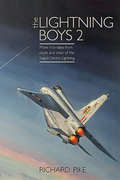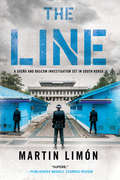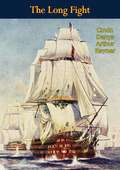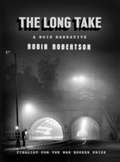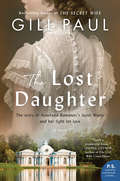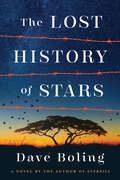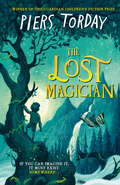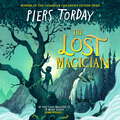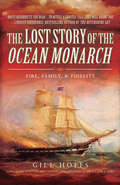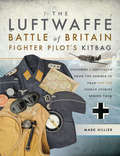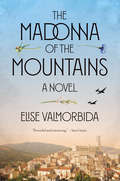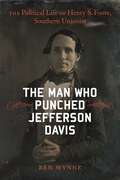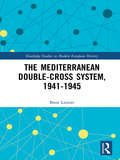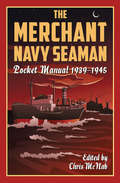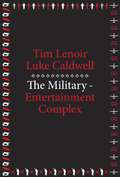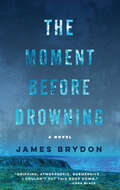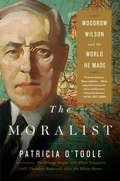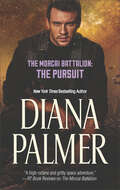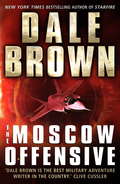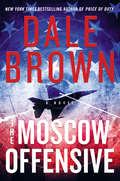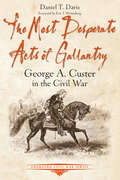- Table View
- List View
The Lightning Boys 2: More True Tales from Pilots and Crew of the English Electric Lightning (The\jet Age Ser. #3)
by Richard PikeExciting, first-hand accounts from Lightning aircrews—the sequel to the bestselling book from the author of the Hunter Boys and Phantom Boys volumes.Lightning Boys 2 is a must-have companion to the first collection and continues the theme of tales from pilots and other crew connected with this iconic aircraft, giving a rare insight into postwar fighter operations. In 20 separate stories to intrigue, amaze, and amuse, the book has also been compiled and written by Richard Pike. The reader is taken to situations as diverse as intercepting 60-plus enemy aircraft, a desperate struggle in a cockpit flooded by tropical downpours, the difficulties of being affected by sudden and painful toothache at high altitude, and the curious encounter with an unidentified flying object. Yet another chapter paints a dramatic reconstruction of a scene in Germany when a Lightning, having entered an inadvertent, out-of-control spin, began an earthwards plunge towards a town center.
The Line (A Sergeants Sueño and Bascom Novel #13)
by Martin LimonGeorge Sueño and Ernie Bascom return for their thirteenth outing, which takes them from Seoul to the DMZ in their most politically charged murder case yet.The Korean Demilitarized Zone, 1970s: A battered corpse is found a few feet north of the line dividing North and South Korea. When 8th Army CID Agents George Sueño and Ernie Bascom pull the body to the South Korean side on orders from their superiors, they have no idea of the international conflict their small action will spark. Before war breaks out, they must discover who killed Corporal Noh Jong-bei, a young Korean soldier working with the US Army. The murderer could be from either side of the DMZ. But without cooperation between the governments involved, how can two US military agents interrogate North Korean witnesses? What George and Ernie discover gets them pulled off the case, but fearing they’ve put the wrong man behind bars, they disobey orders in an attempt to discover the truth.
The Long Fight
by Cmdr. Denys Arthur RaynerA LONG, DESPERATELY FOUGHT BATTLE BETWEEN THE BRITISH FRIGATE “SAN FIORENZO” AND THE FRENCH FRIGATE “PIEMONTAISE” IN THE INDIAN OCEAN IN 1808…In the path of the three India merchantmen setting out on their long voyage home lurked the French raider based on Mauritius, then known—the year in 1808—as the Ile de France. The frigate San Fiorenzo was despatched to escort them past the danger point. The enemy frigate, Piemontaise, sighted the convoy first, but was in turn sighted by the San Fiorenzo before she could close with and board her prizes. Then ensued a three-day running fight of truly epic quality. The San Fiorenzo, an elderly vessel captured from the French in the Mediterranean a generation earlier, was out-gunned and out-manned; many of her crew had had to be put ashore owing to sickness, and she had just weathered a furious storm. On the other hand she had only recently emerged from dry-dock and could outsail the Frenchman, who had been too long at sea. But more important even than speed and armament were the minds of the opposing captains…
The Long Take: A noir narrative
by Robin Robertson**Shortlisted for the 2018 Man Booker Prize**From the award-winning British author—a poet's noir narrative that tells the story of a D-Day veteran in postwar America: a good man, brutalized by war, haunted by violence and apparently doomed to return to it, yet resolved to find kindness again, in the world and in himself.Walker is a D-Day veteran with post-traumatic stress disorder; he can't return home to rural Nova Scotia, and looks instead to the city for freedom, anonymity and repair. As he finds his way from New York to Los Angeles and San Francisco, we witness a crucial period of fracture in American history, one that also allowed film noir to flourish. The Dream had gone sour but—as those dark, classic movies made clear—the country needed outsiders to study and to dramatize its new anxieties. Both an outsider and, gradually, an insider, Walker finds work as a journalist, and tries to piece his life together as America is beginning to come apart: riven by social and racial divisions, spiraling corruption, and the collapse of the inner cities. Robin Robertson's fluid verse pans with filmic immediacy across the postwar urban scene—and into the heart of an unforgettable character—in this highly original work of art.
The Lost Daughter: A Novel
by Gill PaulIf you loved I Am Anastasia by Ariel Lawhon you won't want to miss this novel about her sister, Grand Duchess Maria. What really happened to this lost Romanov daughter? A new novel perfect for anyone curious about Anastasia, Maria, and the other lost Romanov daughters, by the author of The Secret Wife. 1918: Pretty, vivacious Grand Duchess Maria Romanov, the nineteen-year-old daughter of the fallen Tsar Nicholas II, lives with her family in suffocating isolation, a far cry from their once-glittering royal household. Her days are a combination of endless boredom and paralyzing fear; her only respite are clandestine flirtations with a few of the guards imprisoning the family—never realizing her innocent actions could mean the difference between life and death1973: When Val Doyle hears her father’s end-of-life confession, “I didn’t want to kill her,” she’s stunned. So, she begins a search for the truth—about his words and her past. The clues she discovers are baffling—a jewel-encrusted box that won’t open and a camera with its film intact. What she finds out pulls Val into one of the world’s greatest mysteries—what truly happened to the Grand Duchess Maria?
The Lost Family
by Jenna Blum'A dazzling novel of great compassion' Laura Moriarty'An extraordinary read, the kind of book that makes you sob and smile' Tatiana de Rosnay'Blum plumbs the depths of loss and love in this exquisite page-turner' PeopleIn 1960s Manhattan, patrons flock to Masha's to savor its brisket Wellington and impeccable service, and to admire its dashing owner and head chef, Peter Rashkin. With his movie-star good looks and tragic past, Peter, a survivor of Auschwitz, is the most eligible bachelor in town. But he has resigned himself to a solitary life. Running Masha's consumes him, as does the terrible guilt of having survived the horrors of a Nazi death camp while his wife, Masha - the restaurant's namesake - and two young daughters perished.Then exquisitely beautiful June Bouquet, an up-and-coming model, appears at the restaurant, piercing Peter's guard. Though she is twenty years his junior, the two begin a passionate, whirlwind courtship. When June unexpectedly becomes pregnant, Peter proposes, believing that beginning a new family with the woman he loves will allow him to let go of the atrocities of the past, even though he cannot forget all that he has lost. But over the next twenty years, the indelible sadness of those memories will overshadow Peter, his new wife, June, and their daughter, Elsbeth, transforming them in heartbreaking and unexpected ways.The Lost Family is a charming, funny, and elegantly bittersweet study of the repercussions of loss and love that spans a generation, from the 1960s to the 1980s. It is a vivid portrait of marriage, family, and the haunting grief of World War II.
The Lost History of Stars: A Novel By The Author Of Guernica
by Dave BolingFrom a forgotten moment in history comes an inspiring novel about finding strength and courage in the most unimaginable places. In turn-of-the-century South Africa, fourteen-year-old Lettie, her younger brother, and her mother are Dutch Afrikaner settlers who have been taken from their farm by British soldiers and are being held in a concentration camp. It is early in the Boer War, and Lettie’s father, grandfather, and brother are off fighting the British as thousands of Afrikaner women and children are detained. The camps are cramped and disease ridden; the threat of illness and starvation are ever present. Determined to dictate their own fate, Lettie and her family give each other strength and hope as they fight to survive amid increasingly dire conditions. Brave and defiant, Lettie finds comfort in memories of stargazing with her grandfather, in her plan to be a writer, and in surprising new friendships that will both nourish and challenge her. A beautiful testament to love, family, and sheer force of will, The Lost History of Stars was inspired by Dave Boling’s grandfather’s own experience as a soldier during the Boer War. Lettie is a figure of abiding grace, and her story is richly drawn and impossible to forget.
The Lost Magician
by Piers Torday'If you can imagine it, it exists ... somewhere.' The new spellbinding fantasy adventure from the bestselling, award-winning author of The Last Wild trilogy.1945. They have survived the Blitz, but when Simon, Patricia, Evelyn and Larry step through a mysterious library door, it is the beginning of their most dangerous adventure yet. They discover the magical world of Folio, where an enchanted kingdom of fairy knights, bears and tree gods is under threat from a sinister robot army. The many stories of the Library are locked in eternal war, and the children's only hope is to find their creator - a magician who has been lost for centuries. What they find will change not just their own lives, but the fate of the world, for ever ...An ode to the world of Narnia, The Lost Magician is a classic in the making from one of the UK's most talented children's authors. Praise for Piers Torday:'the new master of books for children who like magic and modernity with their lust for adventure' - The Times
The Lost Magician
by Piers Torday'If you can imagine it, it exists ... somewhere.' A spellbinding adventure from the bestselling, award-winning author of The Last Wild trilogy. 1945. They have survived the Blitz, but when Simon, Patricia, Evelyn and Larry step through a mysterious library door, it is the beginning of their most dangerous adventure yet. They discover the magical world of Folio, where an enchanted kingdom of fairy knights, bears and tree gods is under threat from a sinister robot army. The many stories of the Library are locked in eternal war, and the children's only hope is to find their creator - a magician who has been lost for centuries. What they find will change not just their own lives, but the fate of the world, for ever ...An ode to the world of Narnia, The Lost Magician is a classic in the making from one of the UK's most talented children's authors. Praise for Piers Torday:'The new master of books for children' - The Times(P)2020 Hodder & Stoughton Limited
The Lost Story of the Ocean Monarch: Fire, Family, & Fidelity
by Gill HoffsThe ship was almost instantly in flames Some jumped overboard immediately, and all was in indescribable confusion. The masts began to fall one after another, and it is supposed killed great numbers by their descent. Others, it is feared, were roasted alive, but the majority were drowned. (Hull Advertiser and Exchange Gazette, 25 August 1848)The Ocean Monarch was only a few hours out of Liverpool on 24 August 1848 when a cabin passenger shouted Fire! and all hell broke loose. Bound for Boston with almost 400 people on board, the emigrant ship was soon ablaze with little chance of putting the flames out. People watched helplessly from their cottages along the Welsh coast as some ships ignored the travellers plight while others raced to their aid. On the 170th anniversary of the disaster Gill Hoffs reveals the full story of this forgotten wreck, including tales of French royalty, an American artist, and a courageous stewardess who gave her life to save her fellow travellers. Discover what happened to the passengers and crew, including:James K. Fellows, a kindly American jeweller trying to get home to his familyJotham Bragdon, the first mate who fled the wreck then returned to shore a heroMary Walter and her mysterious family, escaping danger in London only to find greater peril lay at seaFollow the murder trial of a crew of rescuers and find out the real fate of their victim and whether the mysterious Irish toddler Kate found her family again.
The Luftwaffe Battle of Britain Fighter Pilot's Kitbag: Uniforms & Equipment from the Summer of 1940 and the Human Stories Behind Them
by Mark Hillier&“Detail[s] German fighter pilots&’ flying helmets, oxygen masks, goggles . . . and other ephemera . . . brilliantly done—and completely engrossing.&”—The Aviation Historian Reichsmarschall Gring told Hitler that it would take less than a month for his much-vaunted Luftwaffe to conquer the RAF and pave the way for the German invasion of Great Britain. His prediction was to prove disastrously wrong, but for four long months his pilots and aircrew fought for their lives in the skies above the UK. From their bases in continental Europe, the Luftwaffe&’s fighter pilots escorted the great bomber fleets that sought to destroy the RAF&’s airfields and installations, and tackled the Spitfires and Hurricanes deployed to defend Britain&’s towns and cities. Whilst much has been written on the titanic struggle for supremacy fought throughout the summer of 1940 and of the men and machines of both sides, little attention has been paid to what the pilots wore and carried with them in the air. All the objects that a Luftwaffe fighter pilot was issued with during the Battle of Britain are explored in this book in high-definition color photographs, showing everything from the differing uniforms, to headgear, personal weapons, gloves, goggles, parachute packs and the essential life jacket. Each item is fully described and its purpose and use explained. Fly with the Messerschmitt Bf 109s and Bf 110s across the Channel and see what the Luftwaffe aircrew wore as they took on Fighter Command in what was justly called the Battle of Britain. &“An outstanding example of history through artifacts.&”—Schopenhauer's Workshop
The Madonna of the Mountains: A Novel
by Elise Valmorbida“A riveting adventure for the soul . . . just the kind of evocative historical fiction I love.”—Sara Gruen, author of At the Water’s Edge and Water for ElephantsAn epic, inspiring novel about one woman’s survival in the hardscrabble Italian countryside and her determination to protect her family throughout the Second World War—by any means possible Maria Vittoria is twenty-five when her father brings home the man who will become her husband. It is 1923 in the austere Italian mountain village where her family has lived for generations, and the man she sees is tall and handsome and has survived the First World War without any noticeable scars. Taking just the linens she has sewn that make up her dowry and a statue of the Madonna that sits by her bedside, Maria leaves the only life she has ever known to begin a family. But her future will not be what she imagines. The Madonna of the Mountains follows Maria over the next three decades, as she moves to the town where she and her husband become shopkeepers, through the birth of their five children, through the hardships and cruelties of the National Fascist Party Rule and the Second World War. Struggling with the cost of survival at a time when food is scarce and allegiances are questioned, Maria trusts no one and fears everyone—her Fascist cousin, the madwoman from her childhood, her watchful neighbors, the Nazis and the Partisans who show up hungry at her door. As Maria’s children grow up and her marriage endures its own hardships, she must hold her family together with resilience, love, and faith, until she makes a fateful decision that will change the course of all their lives. A sweeping saga about womanhood, loyalty, war, religion, family, food, motherhood, and marriage, The Madonna of the Mountains is a poignant look at the span of one woman’s life as the rules change and her world becomes unrecognizable. In depicting the great cost of war and the ineluctable power of time on a life, Elise Valmorbida has created an unforgettable portrait of a woman navigating both the unforeseen and the inevitable.Advance praise for Madonna of the Mountains“The moral and ethical questions raised propel the story beyond the particulars into the universal.”—Kirkus Reviews“It is a bewitching but entirely unsentimental portrait of one woman’s attempt to keep her family safe in turbulent times.”—The Times (UK), Book of the Month“A solid choice for readers who appreciate layered family sagas.”—Library Journal
The Majors' Holiday Hideaway: The Majors' Holiday Hideaway An Unexpected Christmas Baby Shane Brand's Christmas Mission (American Heroes #43)
by Caro CarsonSwapping houses for Christmas vacation Brought a gift she never imaginedWhile Fort Hood, Texas, isn’t exactly the City of Lights, Major India Woods discovers its hottest attraction—Major Aidan Nord—lives right next door! And they happily enjoy a little no-strings mischief under the mistletoe. Until India discovers Aidan is seeing other women—his adorable twin girls, that is! After a lifetime of globe-trotting, India wonders if this little family could be her biggest adventure.
The Man Who Punched Jefferson Davis: The Political Life of Henry S. Foote, Southern Unionist (Southern Biography Series)
by Ben WynneRegarded as one of the most vocal, well-traveled, and controversial statesmen of the nineteenth century, antebellum politician Henry Stuart Foote played a central role in a vast array of pivotal events. Despite Foote’s unique mark on history, until now no comprehensive biography existed. Ben Wynne fills this gap in his examination of the life of this gifted and volatile public figure in The Man Who Punched Jefferson Davis: The Political Life of Henry S. Foote, Southern Unionist.An eyewitness to many of the historical events of his lifetime, Foote, an opinionated native Virginian, helped to raise money for the Texas Revolution, provided political counsel for the Lone Star Republic’s leadership before annexation, and published a 400-page history of the region. In 1847, Mississippi elected him to the Senate, where he promoted cooperation with the North during the Compromise of 1850. One of the South’s most outspoken Unionists, he infuriated many of his southern colleagues with his explosive temperament and unorthodox ideas that quickly established him as a political outsider. His temper sometimes led to physical altercations, including at least five duels, pulling a gun on fellow senator Thomas Hart Benton during a legislative session, and engaging in run-ins with other politicians—notably a fistfight with his worst political enemy, Jefferson Davis. He left the Senate in 1851 to run for governor of Mississippi on a pro-Union platform and defeated Davis by a small margin. Several years later, Foote moved to Nashville, was elected to the Confederate Congress after Tennessee seceded, and continued his political sparring with the Confederate president.From Foote’s failed attempt to broker an unauthorized peace agreement with the Lincoln government and his exile to Europe to the publication of his personal memoir and his appointment as director of the United States mint in New Orleans, Wynne constructs an entertaining and nuanced portrait of a singular man who constantly challenged the conventions of southern and national politics.
The Mediterranean Double-Cross System, 1941-1945 (Routledge Studies in Modern European History)
by Brett LintottThis book describes and analyzes the history of the Mediterranean "Double-Cross System" of the Second World War, an intelligence operation run primarily by British officers which turned captured German spies into double agents. Through a complex system of coordination, they were utilized from 1941 to the end of the war in 1945 to secure Allied territory through security and counter-intelligence operations, and also to deceive the German military by passing false information about Allied military planning and operations. The primary questions addressed by the book are: how did the double-cross-system come into existence; what effects did it have on the intelligence war and the broader military conflict; and why did it have those effects? The book contains chapters assessing how the system came into being and how it was organized, and also chapters which analyze its performance in security and counter-intelligence operations, and in deception.
The Merchant Navy Seaman Pocket Manual 1939–1945 (The Pocket Manual Series)
by Chris McNabA view into the world of the intrepid but often forgotten seamen who helped the Allies win WWII. They may not have worn gold braid or medals, but the Allied Merchant Navies in World War II provided a vital service to their countries&’ war efforts. Hundreds of thousands of British and American sailors—some as young as fourteen—faced considerable risks to maintain an essential flow of armaments, equipment, and food: submarines, mines, armed raiders and destroyers, aircraft, kamikaze pilots, and the weather itself. Life on board a merchant ship could be tense, with hour after hour spent battling high seas, never knowing if a torpedo was about to hit. In the Arctic convoys, sailors had to cope with extreme cold and ice. But there was also comradeship and more open society than was the norm at the time, free of distinctions of class, race, religion, age, or color, and a mixture of nationalities, especially in the British fleet. The Merchant Navy Seaman Pocket Manual provides a fascinating glimpse into the world of these brave sailors, many of whom did not return. Drawing on documents, diagrams, and illustrations from British and American archives, it combines information on training, gunnery, convoys, and antisubmarine techniques with dramatic personal accounts. Covering the Battle of the Atlantic, the Arctic Convoys, and the Pacific, this book pitches the reader into the heart of this vital but often forgotten arena of WWII.
The Military and Liberal Society: Societal-Military Relations in Western Europe (Cass Military Studies)
by Tomas KuceraThis book describes to what extent and in what ways the military policies of Western European societies are determined by liberal ideology. A wide variety of issues affected by liberal ideology, including conscription, conscientious objection, military mission, military ethics and the professional identity of soldiers are addressed in the book. The empirical analysis draws on the cases of the German Bundeswehr (from the 1950s onwards), the Swedish Armed Forces (the transformation after the end of the Cold War), and the British Armed Forces (from the beginning of the twentieth century onwards). The book’s examination of these cases reveals that specific policies, institutions and practices are preferred because of their relation to liberalism. Since Samuel Huntington’s seminal book The Soldier and the State the literature on civil-military relations and military sociology depicts the relationship between liberal ideology and military security as intrinsically antithetical. This book is conceived as a critical debate with Huntington. Contrary to the notion of antithetical societal-military relationship, this book demonstrates that a meaningful adaptation of the military to the principles possessed by its parent society can be, more often than not, desirable also from the perspective of security strategy. This book will be of considerable interest to students of civil-military relations, military sociology, Western European politics, security studies and IR.
The Military: Entertainment Complex (MetaLABprojects)
by Tim Lenoir; Luke CaldwellWith the rise of drones and computer-controlled weapons, the line between war and video games continues to blur. In this book, the authors trace how the realities of war are deeply inflected by their representation in popular entertainment. War games and other media, in turn, feature an increasing number of weapons, tactics, and threat scenarios from the War on Terror. <p><p> While past analyses have emphasized top-down circulation of pro-military ideologies through government public relations efforts and a cooperative media industry, The Military-Entertainment Complex argues for a nonlinear relationship, defined largely by market and institutional pressures. Tim Lenoir and Luke Caldwell explore the history of the early days of the video game industry, when personnel and expertise flowed from military contractors to game companies; to a middle period when the military drew on the booming game industry to train troops; to a present in which media corporations and the military influence one another cyclically to predict the future of warfare. <p> In addition to obvious military-entertainment titles like America’s Army, Lenoir and Caldwell investigate the rise of best-selling franchise games such as Call of Duty, Battlefield, Medal of Honor, and Ghost Recon. The narratives and aesthetics of these video games permeate other media, including films and television programs. This commodification and marketing of the future of combat has shaped the public’s imagination of war in the post-9/11 era and naturalized the U.S. Pentagon’s vision of a new way of war.
The Million-Dollar Man Who Helped Kill a President: George Washington Gayle and the Assassination of Abraham Lincoln
by Christopher McIlwainGeorge Washington Gayle is not a name known to history. But it soon will be. Forget what you thought you knew about why Abraham Lincoln was assassinated by John Wilkes Booth. No, it was not mere sectional hatred, Booth’s desire to become famous, Lincoln’s advocacy of black suffrage, or a plot masterminded by Jefferson Davis to win the war by crippling the Federal government. Christopher Lyle McIlwain, Sr.’s Untried and Unpunished: George Washington Gayle and the Assassination of Abraham Lincoln exposes the fallacies regarding each of those theories and reveals both the mastermind behind the plot, and its true motivation. The deadly scheme to kill Lincoln, Vice President Andrew Johnson, and Secretary of State William Seward was Gayle’s brainchild. The assassins were motivated by money Gayle raised. Lots of money. $20,000,000 in today’s value. Gayle, a prominent South Carolina-born Alabama lawyer, had been a Unionist and Jacksonian Democrat before walking the road of radicalization following the admission of California as a free state in 1850. Thereafter, he became Alabama’s most earnest secessionist, though he would never hold any position within the Confederate government or serve in its military. After the slaying of the president Gayle was arrested and taken to Washington, DC in chains to be tried by a military tribunal for conspiracy in connection with the horrendous crimes. The Northern press was satisfied Gayle was behind the deed—especially when it was discovered he had placed an advertisement in a newspaper the previous December soliciting donations to pay the assassins. There is little doubt that if Gayle had been tried, he would have been convicted and executed. However, he not only avoided trial, but ultimately escaped punishment of any kind for reasons that will surprise readers. Rather than rehashing what scores of books have already alleged, Untried and Unpunished offers a completely fresh premise, meticulous analysis, and stunning conclusions based upon years of firsthand research by an experienced attorney. This original, thought-provoking study will forever change the way you think of Lincoln’s assassination.
The Moment Before Drowning: A Novel
by James Brydon"Brydon's provocative and unsettling first novel...is a remarkably assured debut by a gifted new writer."--Publishers Weekly, STARRED review, Pick of the Week"James Brydon's brilliant The Moment Before Drowning isn't an easy read. Not because of its style, which is sensuous and elegant, but because of its subject matter: the brutality behind war's front lines...After reading The Moment Before Drowning, dedicated readers might want to watch the award-winning docudrama The Battle of Algiers, which covers much of the same territory as Brydon's heart-wrenching novel."--Mystery Scene Magazine"An exploration of political oppression wrapped in a carefully constructed mystery. In Brydon's auspicious debut...the characters are alive and the mystery is mostly satisfying. An erudite and entertaining addition to the shelf."--Kirkus Reviews"Brydon's The Moment Before Drowning is one of the season's most remarkable debuts and the launch of a complex and truly memorable protagonist, Captain Jacques le Garrec, a lion of the French Resistance, now disgraced by his intelligence service in Algeria and returned to his hometown in Brittany, where he's promptly charged with investigating a cold case murder. Le Garrec has stepped directly out of a Jean-Pierre Melville film and into a seaside murder mystery, a noir and ambiguous figure setting out to right wrongs in a world ever more unknowable."--CrimeReads, included in 10 Debut Crime Novels to Read This July"The Moment Before Drowning is a highly lyrical novel. Brydon's prose is exquisite, and he certainly knows how to set a scene."--New York Journal of BooksIncluded in CBC Radio's The Homestretch's Fall 2019 Mystery Selections"A stunning and intelligent debut novel; powerful, intense and raw."--Nudge-Book (UK)"A skillfully constructed and absolutely riveting thriller of a novel by a genuine master of character and narrative driven storytelling, James Brydon's The Moment Before Drowning is an especially recommended addition to community library collections."--Midwest Book Review"Brydon packs in so much emotion, suspense, tension, and heartbreak. This story literally took my breath away...This author is one to be reckoned with and I hope his next literary work will be published soon. Most highly recommended."--Marjorie's World of Books (blog)"The ending, whilst not the one that might have been expected, is one that has occurred many times in literature of all kinds but it doesn't seem in any way hackneyed. This is because the author has taken the trouble to detail the psychology involved in the murder and convinces us that what happened was a consequence of an aspect of human nature that never changes."--Crime Review (UK)December 1959: A furious anticolonial war rages in Algeria. Captain Jacques le Garrec, a former detective and French Resistance hero, returns to France in disgrace. Traumatized after two years of working in the army intelligence services, he's now accused of a brutal crime.As le Garrec awaits trial in the tiny Breton town where he grew up, he is asked to look into a disturbing and unsolved murder committed the previous winter. A local teenage girl was killed and her bizarrely mutilated body was left displayed on the heathland in a way that no one could understand.Le Garrec's investigations draw him into the dark past of the town, still haunted by memories of the German occupation. As he tries to reconstruct the events of the murder, the violence of this crime and his recollections of Algeria intertwine, threatening to submerge him.
The Moralist: Woodrow Wilson and the World He Made
by Patricia O'Toole“O’Toole does full justice to Wilson’s complexities, but it is with the coming of the war that her narrative takes on something close to Shakespearean dimensions...scrupulously balanced...elegantly crafted.”—The Wall Street Journal “Enlightening...O’Toole has done students of American history a great service.”—National Review By the author of acclaimed biographies of Theodore Roosevelt and Henry Adams, a penetrating biography of one of the most high-minded, consequential, and controversial US presidents, Woodrow Wilson (1856-1924). The Moralist is a cautionary tale about the perils of moral vanity and American overreach in foreign affairs.In domestic affairs, Wilson was a progressive who enjoyed unprecedented success in leveling the economic playing field, but he was behind the times on racial equality and women’s suffrage. As a Southern boy during the Civil War, he knew the ravages of war, and as president he refused to lead the country into World War I until he was convinced that Germany posed a direct threat to the United States. Once committed, he was an admirable commander-in-chief, yet he also presided over the harshest suppression of political dissent in American history. After the war Wilson became the world’s most ardent champion of liberal internationalism—a democratic new world order committed to peace, collective security, and free trade. With Wilson’s leadership, the governments at the Paris Peace Conference in 1919 founded the League of Nations, a federation of the world’s democracies. The creation of the League, Wilson’s last great triumph, was quickly followed by two crushing blows: a paralyzing stroke and the rejection of the treaty that would have allowed the United States to join the League. After a backlash against internationalism in the 1920s and 1930s, Wilson’s liberal internationalism was revived by Franklin D. Roosevelt and it has shaped American foreign relations—for better and worse—ever since.
The Morcai Battalion: The Pursuit (The Morcai Battalion #5)
by Diana PalmerA doctor must work with the military commander she left broken hearted in this intergalactic tale of impossible love by a New York Times bestseller. The first time Mekashe, Captain of the Imperial Guard, meets blue-eyed human beauty Jasmine Donally, the two nearly come to blows. Forever devoted to the Cehn-Tahr, Mekashe is forced to sever ties with the object of his adoration. Years pass before their paths cross again, but Mekashe hasn&’t forgotten what transpired—or the way she makes his heart race. But even if he can forgive the past, insurmountable barriers still threaten to keep them worlds apart. With their mutual attraction escalating quickly, they&’ll have to find a way to bridge the gap—or be lost to each other forever. Praise for The Morcai Battalion: The Pursuit &“Palmer&’s futuristic, interspecies romance is a sweet story with a sad and tragic twist. Readers will truly wonder if these two protagonists will ever get past their differences and have the happy ending that they truly deserve.&” —RT Book Reviews
The Moscow Offensive
by Dale BrownAmerica's first line of defense - Brad McLanahan and the heroes of the Iron Wolf Squadron - must counter a dangerous Russian strike from within the homeland in this cutting-edge tale from the New York Times master of the high-tech military thriller, Dale Brown.On a remote island estate, a billionaire investor sells his air freight company to a mysterious new owner. The purchaser is none other than the President of Russia, Gennadiy Gryzlov. The Russians will use these private planes to secretly transport dangerous cargo into the United States.The inept American President Stacy Anne Barbeau has failed to account for the Russian threat. But others have been vigilant and will not leave America defenseless. Brad McLanahan and the Iron Wolf Squadron have joined forces with the newly formed Alliance of Free Nations in Eastern Europe, to prepare for the attack they know is imminent. Working with the most cutting-edge technology, the team will deploy CIDs-Cybernetic Infantry Devices-twelve-foot-tall humanoid combat robots, each armed with more firepower than a conventional platoon.But their state-of-the-art weapons may not be enough to combat the threat. The Russians have managed to reverse engineer their own combat robots nearly decimated in a previous attack, and have slowly begun smuggling them across America's borders. Dealing with an unprecedented danger and a feckless president and congress, McLanahan and the Iron Wolf Squadron will once again put their own lives on the line to check this new Russian peril and keep the home of the brave and the free world safe.
The Moscow Offensive: A Novel (Patrick Mclanahan Ser. #22)
by Dale BrownAmerica’s first line of defense—Brad McLanahan and the heroes of the Iron Wolf Squadron—must counter a dangerous Russian strike from within the homeland in this cutting-edge tale from the New York Times master of the high-tech military thriller, Dale Brown.On a remote island estate, a billionaire investor sells his air freight company to a mysterious new owner. The purchaser is none other than the President of Russia, Gennadiy Gryzlov. The Russians will use these private planes to secretly transport dangerous cargo into the United States.The inept American President Stacy Anne Barbeau has failed to account for the Russian threat. But others have been vigilant and will not leave America defenseless. Brad McLanahan and the Iron Wolf Squadron have joined forces with the newly formed Alliance of Free Nations in Eastern Europe, to prepare for the attack they know is imminent. Working with the most cutting-edge technology, the team will deploy CIDs—Cybernetic Infantry Devices—twelve-foot-tall humanoid combat robots, each armed with more firepower than a conventional platoon.But their state-of-the-art weapons may not be enough to combat the threat. The Russians have managed to reverse engineer their own combat robots nearly decimated in a previous attack, and have slowly begun smuggling them across America’s borders. Dealing with an unprecedented danger and a feckless president and congress, McLanahan and the Iron Wolf Squadron will once again put their own lives on the line to check this new Russian peril and keep the home of the brave and the free world safe.
The Most Desperate Acts of Gallantry: George A. Custer in the Civil War (Emerging Civil War Series)
by Daniel T. Davis“Presents Custer’s Civil War accomplishments in clear and engaging prose, while its ample images and battle maps place unfamiliar readers in the action.” —The Civil War MonitorThrough the passage of time, Lt. Col. George Armstrong Custer’s last fight, the Battle of the Little Bighorn in 1876, has come to overshadow the rest of his military career, which had its brilliant beginning in the American Civil War.Plucked from obscurity by Maj. Gen. George McClellan, Custer served as a staff officer through the early stages of the war. His star began to rise in late June, 1863, when he catapulted several grades to brigadier general and was given brigade command. Shortly thereafter, at Gettysburg and Buckland Mills, he led his men—the Wolverines—in some of the heaviest cavalry fighting of the Eastern Theater.At Yellow Tavern, Custer’s assault broke the enemy line, and one of his troopers mortally wounded the legendary Confederate cavalryman, J.E.B. Stuart. At Trevilian Station, his brigade was nearly destroyed. At Third Winchester, he participated in an epic cavalry charge. Elevated to lead the Third Cavalry Division, Custer played a major role at Tom’s Brook and, later, at Appomattox, which ultimately led to the surrender of the Army of Northern Virginia.Historian Daniel T. Davis, a long-time student of George Custer, has spent countless hours walking and studying the battlefields where Custer fought in Virginia, Maryland, and Pennsylvania. In The Most Desperate Acts of Gallantry, he chronicles the Civil War experiences of one of the most recognized individuals to emerge from that tragic chapter in American history.“A fast-paced study, engaging study.” —Journal of the Shenandoah Valley During the Civil War Era
